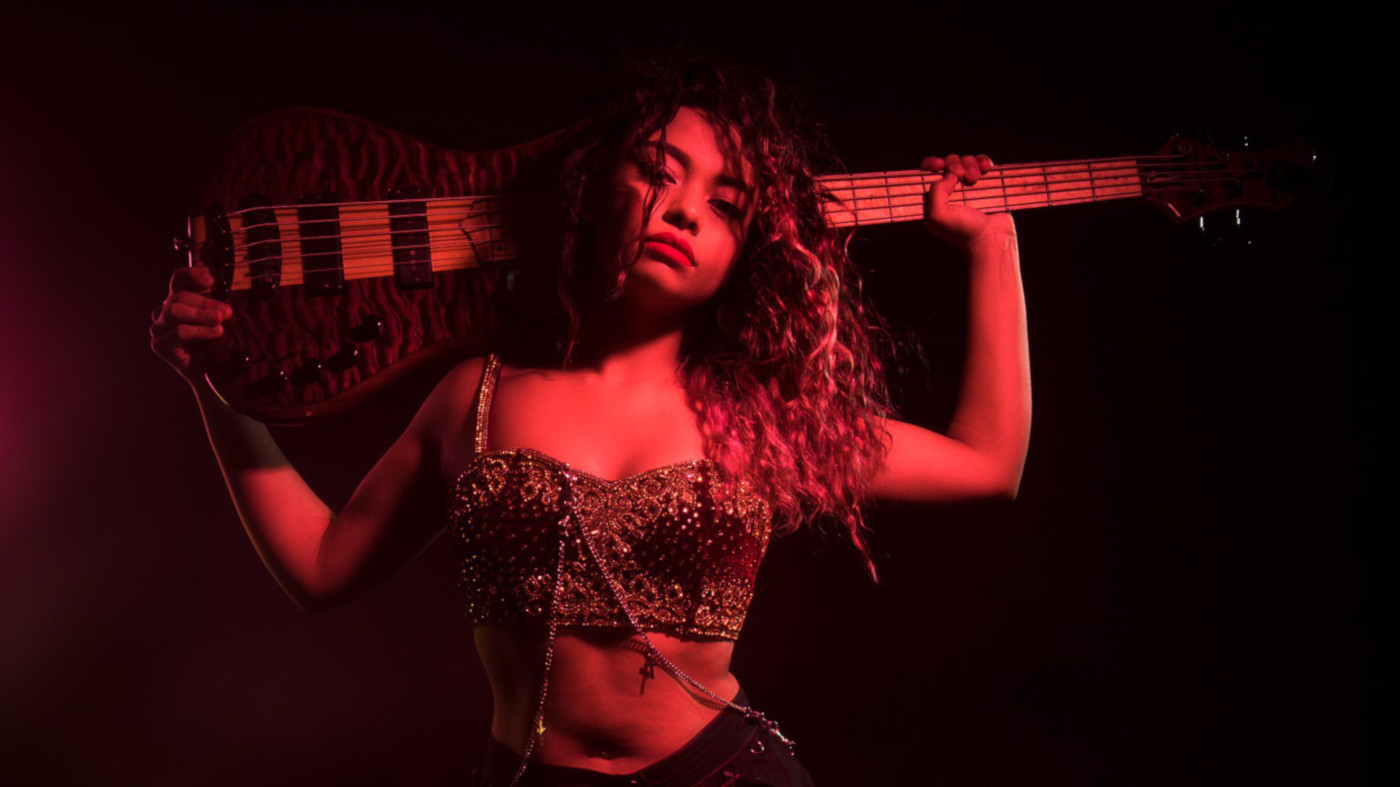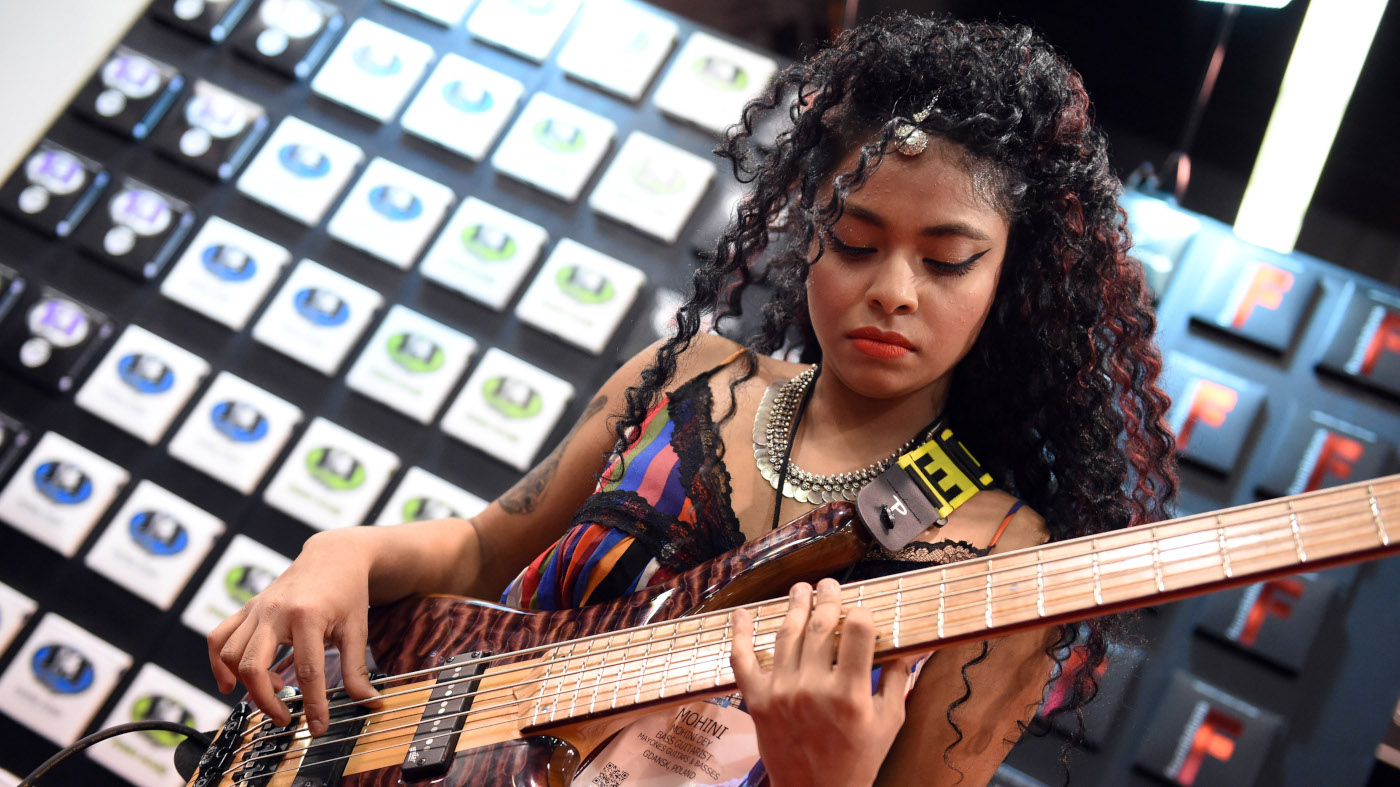Mohini Dey: “Give people what they want when you’re working for them. You should serve their music and not just yourself”
The fast-rising bass talent on her astounding journey

Want all the hottest music and gear news, reviews, deals, features and more, direct to your inbox? Sign up here.
You are now subscribed
Your newsletter sign-up was successful
A genuinely astounding bassist, Mohini Dey has enjoyed a rapid ascent to worldwide renown in recent years.
As a kid she performed alongside a fearsome range of talent in her home town of Mumbai, including the composers A.R. Rahman and Nitin Sawhney, before coming to the attention of another stellar cast of players in the West.
Musicians such as Guthrie Govan, Dave Weckl, Jordan Rudess, Steve Vai, Mike Stern, George Brooks and Narada Michael Walden have shared a stage or studio with Dey, and no modern NAMM Show is complete without her.
I started working professionally when I was nine years old and I’m 22 now, so it’s been 13 to 14 years
What are your current projects, Mohini?
“Right now I’m learning songs for a Japanese tour that I’m part of. I’m touring with this band called B’z for four-and-a-half months. It’s a long one. I’m writing out charts for those songs right now. It’s Japanese music - rock and roll, a little bit of pop, a little bit of funk, and rock - so it’s going to be fun.”
Are the bass parts demanding?
“Yes, very much, actually. It’s completely different from what I usually play, because I’m very technical with my kind of playing, with the slapping and popping and stuff. Their songs are a little bit more laid-back, but there’s still room for improvisation.
Want all the hottest music and gear news, reviews, deals, features and more, direct to your inbox? Sign up here.
“I’m also recording for a lot of artists from my home studio in India. I don’t have to travel much, but I get to work from my own home studio, which is a good thing. I also play with a drummer and a guitar player in my own band, Mohini Dey Fusion. We’re playing in Italy in September.”
Do you have a manager, or do people come to you directly with gigs and sessions?
“I started working professionally when I was nine years old and I’m 22 now, so it’s been 13 to 14 years I’ve been working in the industry, and I managed myself for all those years.
“But for the past six months, my boyfriend has been managing me, which is really helping me a lot, because I’m dealing with so much stuff. I just want to work on music and not deal with invoices and talk to organisers. It is just too much to deal with, so I asked my boyfriend, ‘Why don’t you manage me for a while?’
“He loves managing, and he has managed a few artists before, so for the past six months he has been managing me and it has helped a lot with talking with people. I’m tired of it. I just want to rest. The little time that I get, I just want to close my eyes, because that’s what I lack right now.”
High five
It sounds like you’re incredibly busy.
“I’m really thankful for that. I’m very, very blessed and I’m really happy that people want me for what I am, and they don’t want to change me in any way. They want my voice on their songs, which is really great.
“But sometimes what happens is since I am only working with other people, it restricts me from doing my own work. I want to do my own album and write my own songs, which I do on the side, so I wish I could take some time off from working with other people and do my stuff, so I can release an album, but since I’m in demand right now and I don’t want to lose it, I want to make lots of money and invest that in my album. Doing the Japan tour I will have a lot of time in between to work on my own stuff as well.”
Run us through your current gear.
I started playing with four-strings, but after two years I switched to five because I had more room to improvise
“Of course. I play Mayones basses. I currently have five of them and I’m about to get one more. They’ve been really, really nice. I’ve been with them for the past two years and they send me two basses for free each year, completely customised, whatever I want.
“I also endorse Markbass amps. You know how amazing Markbass is. Anything you want they’ll be happy to send, without any questions, because they know how important it is for an artist to have different kinds of gear for different types of music.
“And I endorse Gruv Gear, who have sent me a lot of cases and fret wraps, and Providence cables, TC Electronic pedals, Boss pedals and SIT strings. I play Rock Brights .45 to .125 because I like the high-end. Most bass players playing in metal bands love that, and I love that too, even though I don’t play in a metal band.”
Are you generally a five-string player, or do you play four and six, too?
“I started playing with four-strings, but after two years I switched to five because I had more room to improvise and more room to move around. On four-strings you have to jump to get the second octave, but on the five-string it’s right there, which is fun.
“I tried six-string too, but I have really small fingers and it’s really hard to move on the fretboard, which is really broad. I also have two fretless basses, a Warwick and a Steinberger.”
How did you get started on bass?
“I started learning bass from my dad [renowned session bassist Sujoy Dey] when I was three in 2000. At the time, my dad was playing with a lot of classical musicians in Mumbai. He was practising at home, just like any other day, and he put the headphones on my ears. I loved what he was playing on the headphones and I started tapping the right tempo on my lap.
“Seeing that, my dad encouraged me to learn the bass, but he always told me that there was no pressure or anything. He said, ‘If you really want to do it, you do it. Otherwise, you choose what you want to do.’ I always wanted to become a fashion designer, so I applied to a fashion college and I got selected. By then, I was already playing with a lot of musicians, so I had to choose between music and fashion.”
Was that a difficult decision?
“Not really. I said to myself, ‘Fashion is something I can always do on the side, but music is something that I have practised so much and spent so much time with, I cannot let that go to waste.’
“I then started playing with A.R. Rahman in his band, and it’s been eight years I’ve been playing with him now. I got really into it and started playing with other musicians, and writing my own music, and I guess it just all happened and fell into the right place. I didn’t really choose it. It just kind of happened naturally.”

Grounded
Who were the bass players that you admired when you were learning?
“The first bass player that my dad introduced me to was Jaco Pastorius, at the age of seven or eight. He would want me to learn all the songs and understand why Jaco applied different playing styles.
“I started learning all this, and my dad got me learning to read and write music. He told me, ‘You have to do this, because it’s very important if you want to play on an international level.’ I used to hate to read and write, but I trained myself to have fun with it.”
It’s best when you don’t expect anything, because you can keep challenging and working harder and harder
What’s the music scene like in Mumbai?
“Mumbai is the biggest city when it comes to music. There’s a saying here: if you can survive in Mumbai, you can survive anywhere, because there is a lot of competition here.
“I’m actually moving to Bangalore by the end of this year, but that’s only because my boyfriend lives there. We’ve been dating for over two years now, and I’m always on the road, so it’s hard to meet each other and spend time, so I thought it would be a good thing to move to Bangalore and stay together.
“I can work from anywhere. My parents live in Mumbai, but they’re fine. I’ve been taking care of my own house and my parents’ house since I was 18 years old, so it’s not a big deal.”
So what lies ahead for you?
“It depends, but like I said, everything just flows for me. I have to finish two songs today and I have to finish writing my music for that Italy show. Then I have a rehearsal for a band which is really heavy music, almost death metal, so I’m preparing for that show. And Japan is nearby: I leave in May, and then I’m only back in India in September - a long stretch. Then I go to Italy and when I come back I have a few masterclasses in December. Fortunately, the past two years and this year have been really, really good.”
Is your career working out the way that you hoped it would?
“Yes. I never had any demands or wants in my life. Everything just happened to me, maybe because I was just doing music and I didn’t expect anything. It’s best when you don’t expect anything, because you can keep challenging and working harder and harder and giving people what they want, when you’re working for them. You should serve their music and not just yourself.
“So every time I work with people, I keep that in mind. I guess that’s why people like working with me. I’m really straightforward as a person and I don’t have many demands. I just ask what they want and I give them what they want. I talk to them like I’m talking to you now. It’s the same. I think that’s best.”

